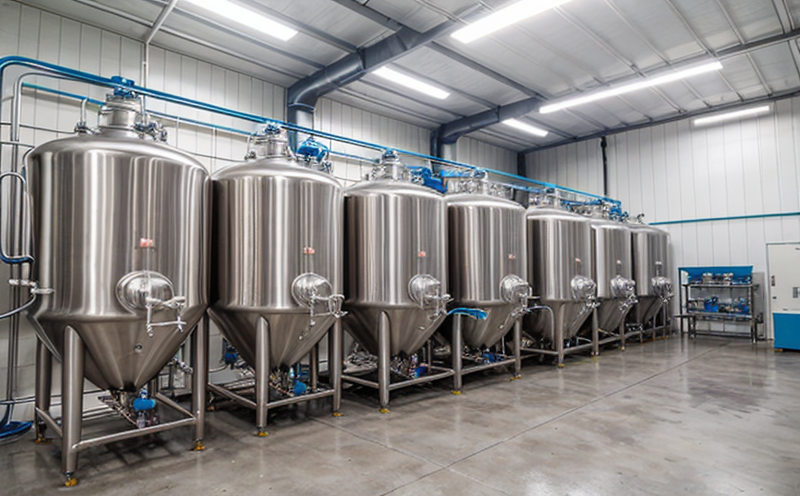ASTM E2998 Validation of Microbiological Methods in Industrial Fermentation
In industrial fermentation processes, maintaining stringent quality control and ensuring reliable microbiological methods are paramount. ASTM E2998 outlines a standardized validation process for microbiological methods used in these processes. This service at Eurolab ensures that the methodologies employed meet international standards, thereby enhancing confidence in product safety and efficacy.
Our team of experts works closely with clients to validate their methods against ASTM E2998 guidelines. This involves a comprehensive approach, which includes selecting appropriate test organisms, establishing recovery conditions, validating detection limits, assessing cross-reactions, and ensuring the method's reproducibility. Each step is critical in confirming that the microbiological method can accurately detect and quantify microorganisms.
The ASTM E2998 validation process begins with a thorough review of the client’s current methodology to identify any potential areas for improvement or discrepancies. Our experts then design a study protocol tailored specifically to the industrial fermentation environment, ensuring all relevant parameters are accounted for. This includes understanding the specific strains and conditions that are critical in the fermentation process.
Once the protocol is finalized, we proceed with method validation using certified reference materials and controlled environmental conditions. The validation process involves multiple replicates to ensure statistical significance and reliability of results. Throughout this phase, our team continuously monitors the data for any inconsistencies or deviations from expected outcomes.
A key aspect of ASTM E2998 is ensuring that the validated method can differentiate between closely related microorganisms accurately. This requires rigorous testing under various conditions to simulate real-world scenarios encountered in industrial fermentation processes. Our facilities are equipped with state-of-the-art laboratories, including clean rooms and high-containment areas, allowing us to conduct these tests safely and effectively.
The final phase of validation involves comparing the results obtained from the new method against a reference standard or a well-established method. This comparison helps establish the accuracy, precision, and robustness of the newly validated method. Our team then prepares a detailed report outlining all aspects of the validation process, including any challenges encountered and solutions implemented.
By adhering to ASTM E2998 standards, our clients gain assurance that their microbiological methods are reliable and consistent across different batches or facilities. This not only enhances product quality but also facilitates smoother compliance with regulatory requirements such as ISO 17025, which mandates proficiency in laboratory services.
Our commitment to excellence extends beyond mere validation; we provide ongoing support through regular audits and updates to ensure the method remains robust over time. With a deep understanding of industrial fermentation processes and microbiological testing, Eurolab is uniquely positioned to offer this valuable service.
Scope and Methodology
The scope of ASTM E2998 validation encompasses a wide range of microbiological methods used in industrial fermentation processes. This includes but is not limited to plate count agar, MPN (most probable number) techniques, and quantitative PCR assays.
The methodology involves several key steps:
- Selection of appropriate test organisms
- Establishment of recovery conditions
- Validation of detection limits
- Evaluation of cross-reactions
- Assessment of reproducibility
We begin by selecting the most suitable test organisms that are representative of those found in industrial fermentation processes. Recovery conditions are then established to ensure accurate detection and quantification of these microorganisms.
Detection limits are validated through multiple replicates, ensuring that even low concentrations of microorganisms can be reliably detected. Cross-reactions are evaluated by testing the method against closely related species to confirm its specificity.
Reproducibility is assessed by conducting parallel tests under identical conditions and comparing results. This ensures that the method produces consistent results across different operators, instruments, and laboratories.
Eurolab Advantages
- Expertise: Our team comprises seasoned microbiologists with deep experience in industrial fermentation processes.
- Facilities: State-of-the-art laboratories equipped to handle a variety of samples and conditions.
- Compliance: Adherence to international standards such as ISO 17025 ensures reliable and consistent results.
- Support: Ongoing support through regular audits and updates to maintain method reliability over time.
- Efficiency: Streamlined processes that minimize turnaround times without compromising quality.
International Acceptance and Recognition
The ASTM E2998 validation process is widely recognized globally, ensuring that the methods used in industrial fermentation are consistent and reliable. This recognition enhances trust among clients, partners, and regulatory bodies.
Our adherence to international standards such as ISO 17025 further solidifies our reputation for providing high-quality laboratory services. By validating methods against these stringent criteria, we ensure that the results obtained are credible and meet global expectations.
The international acceptance of ASTM E2998 validation is particularly beneficial in industries where compliance with multiple regulatory frameworks is essential. Our service helps clients navigate these complexities by providing a single, internationally recognized standard for microbiological method validation.





